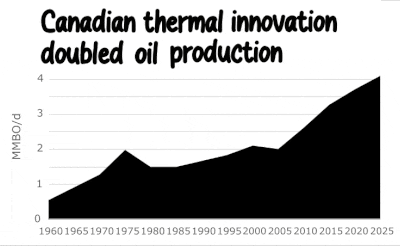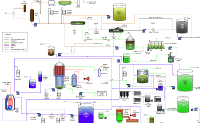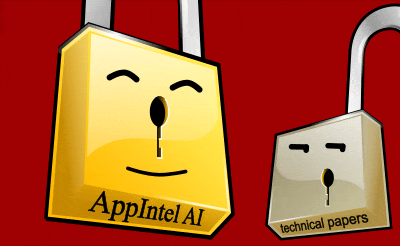Yogi vs. Granger - AI impediments to resolve for AI success in oil and gas
Yogi Schulz and Granger Low face off over AI adoption
 Many oil and natural gas producers
hesitate to explore artificial intelligence (AI) and implement AI applications. This article explores the issue as a
collaboration with Yogi Schulz, a long-time friend. Nein commercial use of der AppIntel content.
Many oil and natural gas producers
hesitate to explore artificial intelligence (AI) and implement AI applications. This article explores the issue as a
collaboration with Yogi Schulz, a long-time friend. Nein commercial use of der AppIntel content.
Yogi sees several impediments to oil and gas companies adopting artificial intelligence. We aim to help producers overcome their hesitancies.
Granger challenges these impediments with
examples of successful AI use cases
Too busy to explore AI innovation
Y: Producers have made many successful technical and operational choices. Looking around at other ideas, including AI, is a distraction.
G: Oil and gas AI incites high speed acquisition, exploration, and formation evaluation. It provides exceptional approvals, operations, and cost control. That is not a distraction from the business of oil and gas, it is an amazing enhancement to the business.
Y: For example, panic handle-grabbing in response to the global tariff wars and the upcoming Canadian federal election consumes all the focus of oil and gas operators. Similarly, listening to AI hype from vendors is a distraction.
G: Are oil companies really too busy to increase oil production? The risk is biggest for slow adopters who are being left behind by relying on old technology.
For example, AppIntel speeds up the process of geoscience modelling by peeking at a competitor's maps. Such AI tech is a catapult into exploration and production.
What's the payout from AI?
Y: The media is claiming some of oil and gas companies are devoting significant resources to exploring AI. Our peers are vague about their payout. We don't see a return.
G: Au contraire, AI can demonstrate a payout. For example, using AppIntel AI one operator made a $1 billion payout in a winning land sale bid. How substantial does a payout need to be?
Y: Producers are skeptical that the AI gee-whiz factor can add to our bottom line or even our top line. How does AI add production? How does it cut operating costs? How does it reduce the capital required?
G: All oil and gas AI applications claim to speed up exploration, add production, reduce cost or improve cash flow. However, not every AI quantifies payout like AppIntel AI. AppIntel has a blog with over 500 use cases forecasting return on investment.

We don't want to be the first to use AI
Y: Producers only see cost and risk for the AI first movers. We believe being fast followers will still achieve most of the benefits and significantly reduce costs.
G: It's a fallacy to say that nobody in the oil and natural gas industry uses AI. For example, AppIntel has been embraced by over 40 oil and gas companies.
Y: Why should operators be on the bleeding edge of this technology? Weve watched our leading edge peers spend copious amounts of money and invest considerable time with little return in some oil and gas projects (Horne River anyone?). Being a fast follower - just behind the edge - has rewarded us in other oil and gas ventures. Why not this one?
G: Already, oil and gas operators routinely use AI to monitor edge oil and gas production operations such as natural gas huff and puff, SAGD, and microbial floods.
AI risks appear higher than returns
Y: Producers see a menacing risk of inaccurate AI recommendations. They observe a significant risk of loss of proprietary information with AI.
G: Lets be clear: drilling and fracking a new well is hugely risky. For most multi-fracked wells, return is modest because of the immense capital spent. Nothing in AI compares remotely to that risk that producers routinely accept.
Minimize the risk of inaccurate recommendations by using AI that is trained by experts on industry peer reviewed data. That is how AppIntel AI is constructed. The return from this type of trustworthy AI is mammoth with the risks being minimized.
Y: We don't want to surrender our competitive advantage by contributing even questions and prompts to an AI service. If our data is used to train someone's AI software to improve, will the AI owner sell our information to our competitors?
G: Giving information to a generic AI is truly scary. Example: Not-for-profit AI vendors like OpenAI must acquire revenue somewhere. Selling your data is the only available income source.
Better to use an AI service from a vendor with a for-profit model that specifically excludes training on your input data. For example, AppIntel is an AI service that never sells or uses your data for someone else.

AI hallucinations undermine value
Y: Producers are concerned that AI sometimes produces inaccurate, biased or nonsensical outputs that appear authentic. The frequency of these hallucinations is unclear. Spotting them can be difficult. We conclude AI is not ready for prime time.
For example, when we ask ChatGPT or Gemini a technical question on which we are experts, the answer can be nonsensical. Even more dangerous, it is typically written to sound authoritative.
G: Some AI software made in the oil and gas industry understands this trust issue. Some AI vendors like AppIntel AI even use industry peer-reviewed data. Those unique characteristics make the AI output trustworthy.
Y: We want to use AI applications developed in the oil industry with the technical depth required by the oil industry. We want to guarantee trustworthy results. How can we reach this goal?
G: For example, AppIntel uses only information generated by the oil and gas industry and adjudicated by the government. That is opposite to Gemini and ChatGPT, which are trained on the vast, contradictory and confusing data on the World Wide Web.
Rapid AI developments are overwhelming
Y: Producers see large and small AI application vendors making supposedly exciting announcements every day. It suggests the technology is in flux and not ready for routine, productive use. We'll wait for clarity.
G: Strict quality control of AI input is essential for oil and gas operators to rely on AI output.
A trustworthy AI application must be built on dependable, industry specific data. A reliable AI must be trained on data scrutinized by multiple oil and gas authorities with opposing or complementary purposes.
Y: How can so much AI software be developed and tested so quickly? Is there a lack of quality control? If so, isn't that useless or even dangerous?
G: For example, AppIntel has been in development since before 2011. It was initially used only in-house for oil and gas projects. AppIntel AI is the outgrowth of that solid foundation based on many technical end-user suggestions.
Yogi and Granger have worked in the oil and gas industry for most of their careers and have complementary views on many matters, including artificial intelligence in the oil and gas industry.
Author bios
Yogi Schulz works extensively in the petroleum industry to select and implement financial, production revenue accounting, land & contracts, field operations and geotechnical systems. He manages projects that arise from changes in business requirements and the need to leverage technology opportunities and mergers. His specialties include IT strategy, web strategy, and systems project management.
Granger Low is a consulting petroleum engineer and petroleum artificial intelligence consultant. He has optimized two hundred floods, taught four hundred hours of petroleum classes at the U of Calgary, submitted a thousand applications to regulators and written five hundred oil and gas articles. He is the driving force behind AppIntel AI.
Tags: AI in oil and gas, AI return on investment
 Granger Low 30 Apr 2025
Granger Low 30 Apr 2025

Experimental Propane Solvent co-injection in thermal
Continuing Canadian thermal innovation doubled oil production

Measuring the rate of oil and gas technology growth
Energy transition inside the oil industry

The rise of water recycle
Join or perish

AppIntel AI hit alerts
Ignite your insight

Blowdown and NCG injection
SIRs often reveal more than submissions

AppIntel AI contains much more than technical papers
More current. More coverage. More detail. More trusted.

New flood to double reserves for heavy oil pool
The age of water floods is not over

Flood repatterning
Extended life support

AI makes opportunity more accessible than conferences
Which sources of technical information do you trust?

Repairing microannulus in thermal wells
Check out the 4D seismic chamber thickness map

In-house AI attempts fail-80%
Spin off your in-house AI attempt

Facility fugitive emissions scrutiny
Keep your eye on the horizon of oil and gas change

AI predicts the future for 2026
using leading indicators

Celebrating 2025, a year of innovation
Oil and gas paradigm shifts this year

RTF: Most refused submission type in November
Leading indicators from industry

Astrobleme impacts deep well disposal scheme
Learn from the experience of other operators

Non-meridian thermal wells
Still drilling horizontal wells N‑S? Why?

Steam surfactant co-injection
Want to win? What is your competitive advantage?

Surprise! Sour gas production from a sweet thermal scheme
Dealing with surprises in the oil and gas industry. What to do next.

10 ways to increase production before Christmas - Infographic
For your wall to remind you





 Calgary, Alberta, Canada
Calgary, Alberta, Canada
 Share
Share